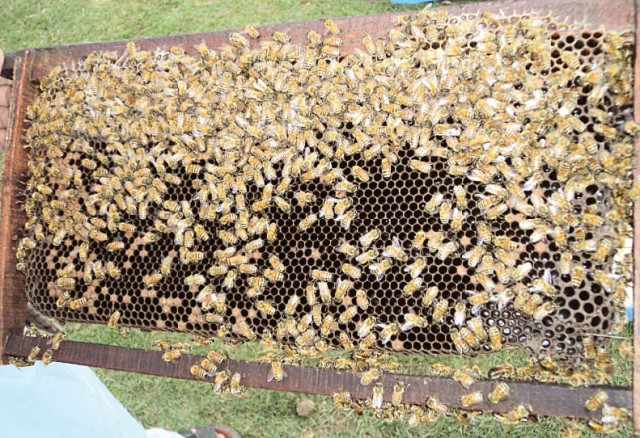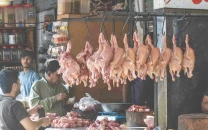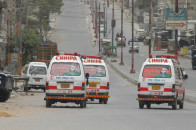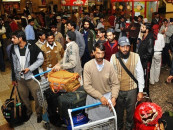Buzzing bees: The sweet art of making honey
The popular industry has hit bottom rock after floods and militancy.

Honey from Swat is cherished not only for its medicinal value, but also for its high quality and purity throughout the world. The indigenous occupation of beekeeping has been active in the valley since times immemorial, when people keep honeybees in muddy pots in their houses. The small honeybees get nectar in the spring, and produce pure honey, which is sold for Rs2,000 per kilogram. However, the onslaught of last year’s floods and preceding militancy in the area affected not only the honeybee industry, but also ‘mobile’ beekeeping.
Salarzai, an old woman from the Melaga area of Kabal Tehsil has been beekeeping for a long time. About the various problems in rearing bees, she told The Express Tribune, “We have been rearing bees at our houses; we installed a mud pot, called Qandeel, within a wall of the house, which attracts local bees. Honeybees come every year from the nearby hills. They produce sufficient honey, which we sell to earn a livelihood for our families. But after our houses were hit by shelling and the hives were destroyed during the militancy, we had to reestablish the hives, only to see the flood hit our houses and leave us with nothing. Till this moment, we have not been helped by the government.”
Sarhad Rural Support Programme (SRSP) with the funding support of Interchurch Organisation for Developmental Cooperation (ICCO) conducted different training exercises on beekeeping, which helped indigenous beekeepers by teaching them new techniques. “After the training, our output will definitely increase and will earn more money for us,” she added.
Nazia Khan and Farida, two master trainers who conducted the training for female beekeepers, spoke of Swat valley’s great potential for beekeeping in the valley. “Swat is lush green and full of flowers, so there is great potential in the business of beekeeping, but proper training is required. Rain is dangerous for beehives. Instead of relying on migrating bees, warm farms should be developed, which will not only save money, but will also increase production.”
Fazal Maula, a trainer and researcher in the Agriculture Research Institute Swat, told The Express Tribune, “Beekeeping, has been historically carried out in Swat. People have been keeping stationary bees in their homes, which is an indigenous method and completely different from mobile beekeeping. Though it is a technical job, it earns a lot for them if done properly.”
About the specialty of the Swati honey, Maula said, “The main problem faced by beekeepers, is the lack of technical know-how, because they cannot tackle issues created different diseases and smites. Secondly, they cannot exploit the spring season properly. They should have more coordination with other farmers.” About the importance of the honey bee, he added that it not only produces honey, but also increases crop production up to 40 per cent in the area. “The floods completely destroyed the mobile beekeeping business because the month of July is the high season for honey bees. However, due to last year’s flood in the area, the business completely collapsed. Deforestation has also harmed its potential because when pine is cut, cover for different flowers and plants are lost,” he added.
Published in The Express Tribune, August 9th, 2011.


















COMMENTS
Comments are moderated and generally will be posted if they are on-topic and not abusive.
For more information, please see our Comments FAQ